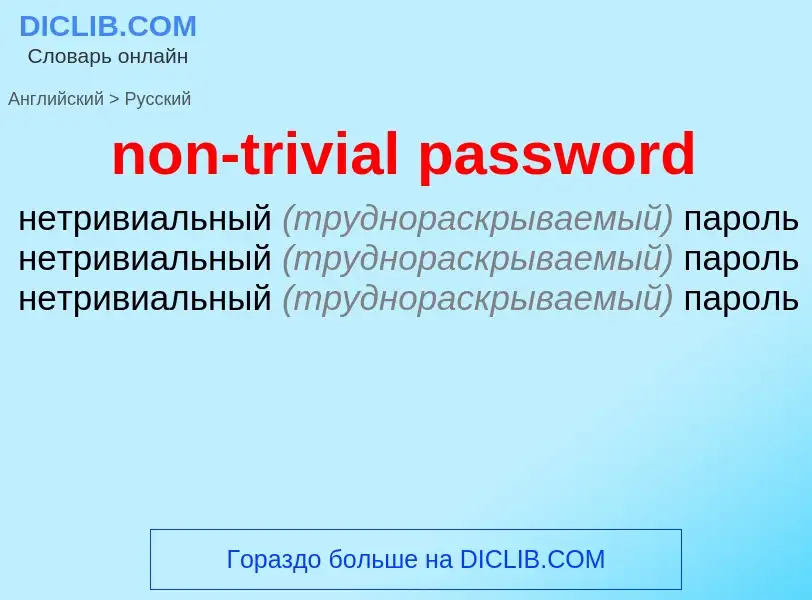Перевод и анализ слов искусственным интеллектом ChatGPT
На этой странице Вы можете получить подробный анализ слова или словосочетания, произведенный с помощью лучшей на сегодняшний день технологии искусственного интеллекта:
- как употребляется слово
- частота употребления
- используется оно чаще в устной или письменной речи
- варианты перевода слова
- примеры употребления (несколько фраз с переводом)
- этимология
non-trivial password - перевод на русский
['wɔtʃwə:d]
существительное
общая лексика
пароль
лозунг
девиз
призыв
клич
призыв, клич
- enter the password
- guess the password
- key the password
- speak the password
- shut off the password
- type the password
- access password
- active password
- actual password
- algorithmic password
- alpha password
- alternate password
- arbitrary password
- assigned password
- attempted password
- authentic password
- authorized password
- bad password
- bypassing OS password
- captured password
- changeable password
- chosen password
- clear text password
- cognitive password
- common password
- commonly used password
- computer-generated password
- confidentional password
- current password
- default password
- device-derived password
- difficult-to-guess password
- discoverable password
- dynamic password
- easily guessed password
- easy-to-remember password
- enciphered password
- encrypted password
- favourite password
- file access password
- forgotten password
- formatted password
- hard-to-remember password
- illegal password
- incorrect password
- individual password
- invalid password
- log-in password
- log-on password
- long password
- long-standing password
- master password
- memorized password
- message password
- multipart password
- nonsence password
- non-trivial password
- numeric password
- obvious password
- old password
- one-time password
- personal password
- plain text password
- predictable password
- presented password
- primary password
- privileged password
- pronounceable password
- protected password
- purloined password
- random password
- randomly chosen password
- remembered password
- reset password
- resource password
- returned password
- self-created password
- self-generated password
- session password
- simple password
- single-use password
- software-based password
- suspended password
- swapping password
- system password
- system-wide password
- time-dependent password
- traditional password
- transformed password
- trivial password
- unauthorized password
- use-once password
- user password
- user-changeable password
- user-chosen password
- user-entered password
- user-selected password
- valid password
- variable-length password
- verification password
- virtual password
- voice password
- forbidden password
- weak password
['pɑ:swə:d]
общая лексика
пароль
код (последовательность символов), используемый для получения доступа к закрытой (защищенной) системе
существительное
военное дело
пароль
пропуск
Определение
Википедия
In mathematics, the adjective trivial is often used to refer to a claim or a case which can be readily obtained from context, or an object which possesses a simple structure (e.g., groups, topological spaces). The noun triviality usually refers to a simple technical aspect of some proof or definition. The origin of the term in mathematical language comes from the medieval trivium curriculum, which distinguishes from the more difficult quadrivium curriculum. The opposite of trivial is nontrivial, which is commonly used to indicate that an example or a solution is not simple, or that a statement or a theorem is not easy to prove.
The judgement of whether a situation under consideration is trivial or not depends on who considers it since the situation is obviously true for someone who has sufficient knowledge or experience of it while to someone who has never seen this, it may be even hard to be understood so not trivial at all. And there can be an argument about how quickly and easily a problem should be recognized for the problem to be treated as trivial. So, triviality is not a universally agreed property in mathematics and logic.



